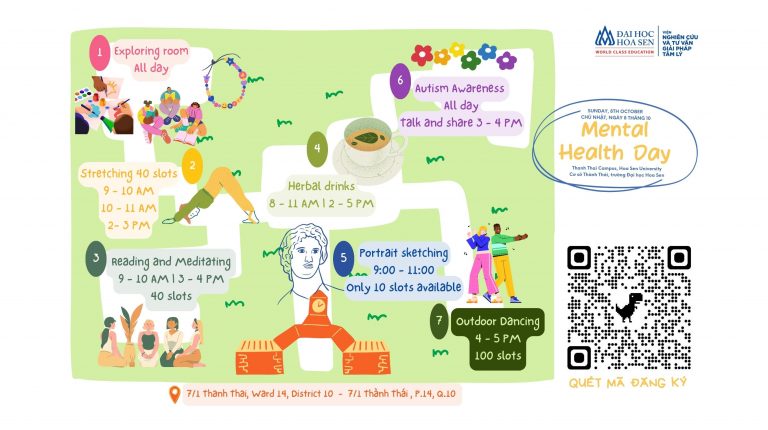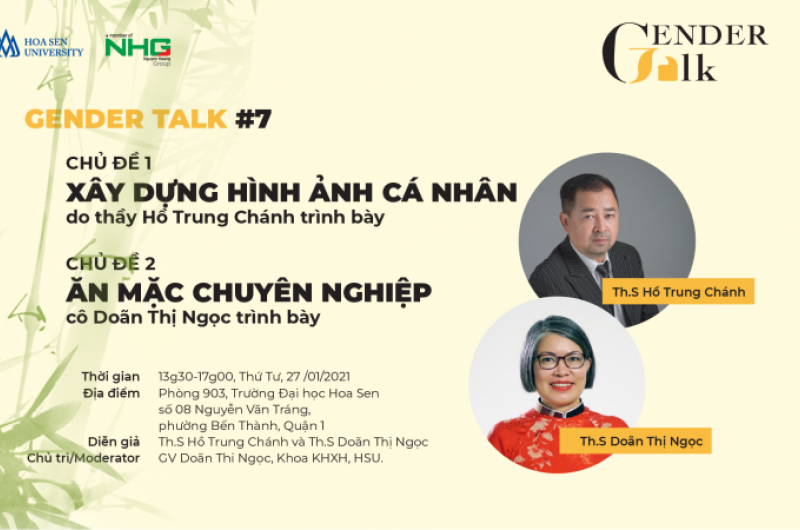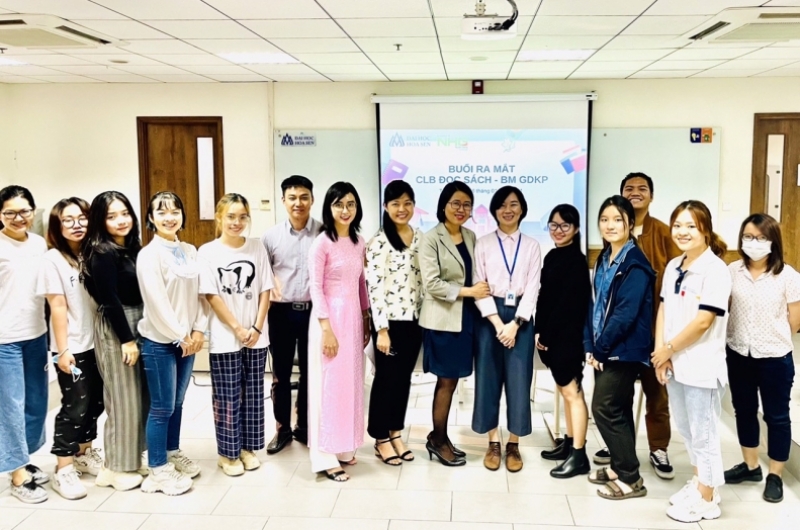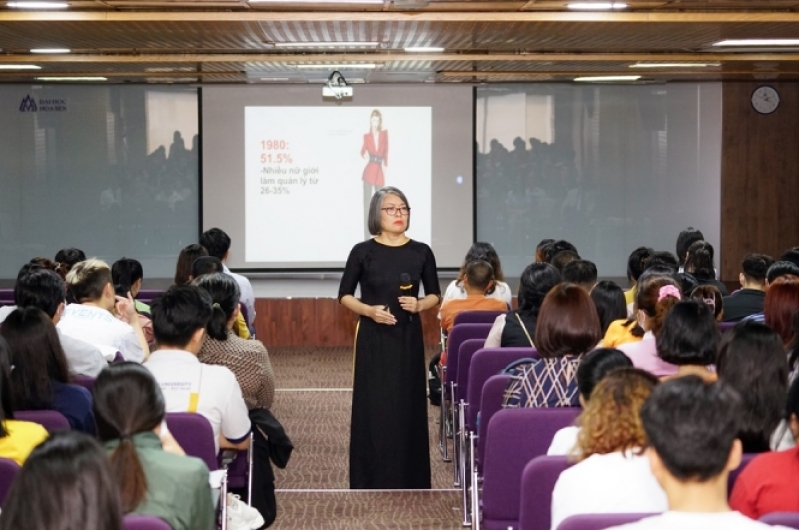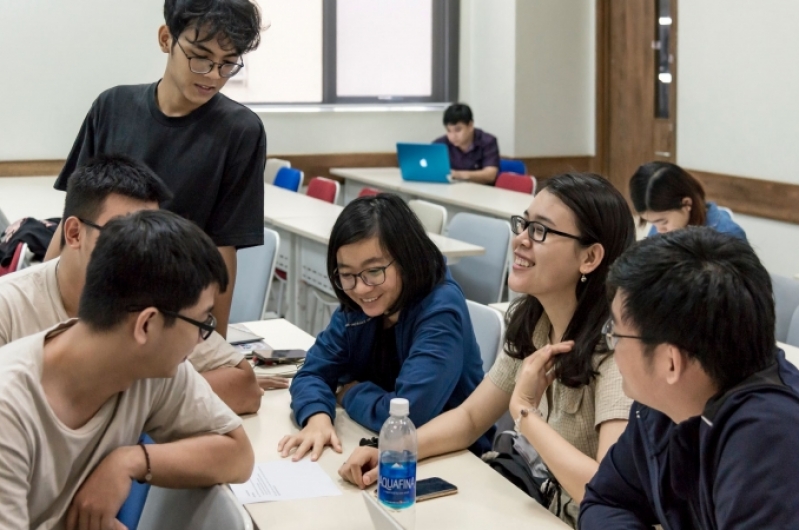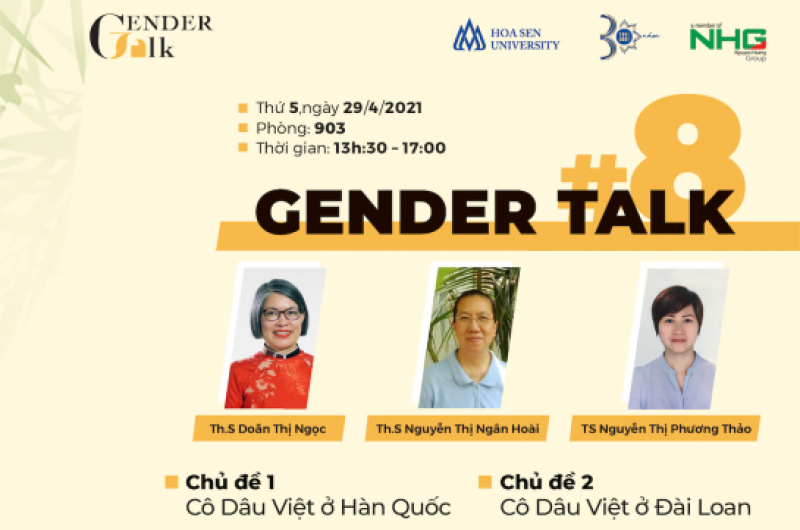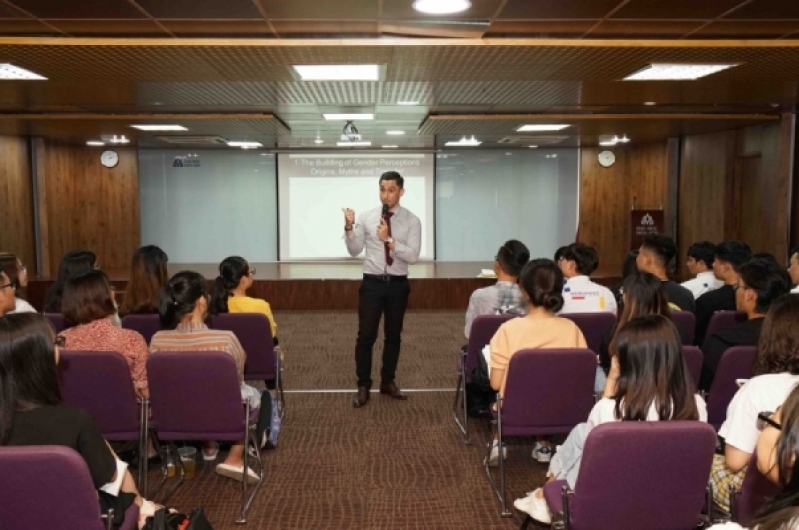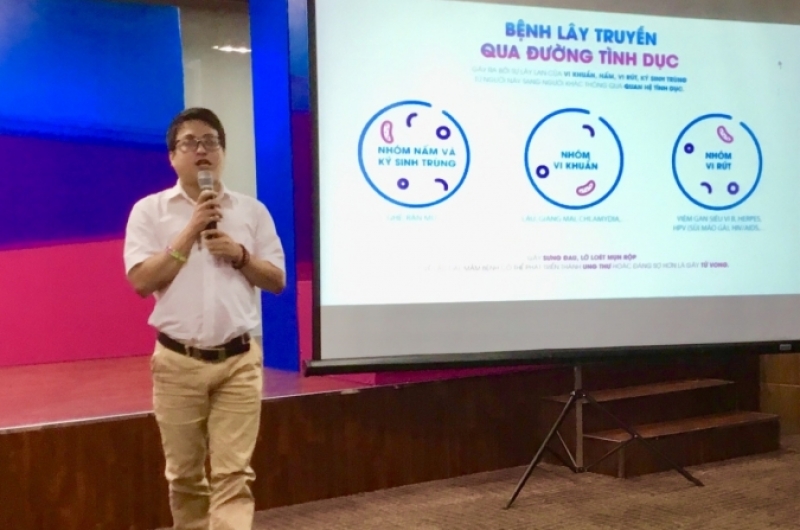Gender Talk #4: The Many Faces of Gender Equality
June 8, 2019
On May 23, 2019, at Hoa Sen University, Gender Talk #4 was held – a Seminar on Gender & Gender Equality (Gender Equality). The conference attracted the participation of a large number of students from Southern Universities, the press, Educators, Psychologists, Social Work Specialists, NGOs, and individuals. Pay attention to gender and gender equality.
Gender Talk #4: Focus on sharing the two topics below:
Topic 1: HIV/AIDS & Safe Sex (HIV/AIDS & Safe Sex) presented by Mr. Nguyen Anh Phong – Chief Representative of VNP+,
Topic 2: Many Faces of Gender Equality presented by Lecturer Doan Thi Ngoc, Faculty of Social Sciences, Hoa Sen University.
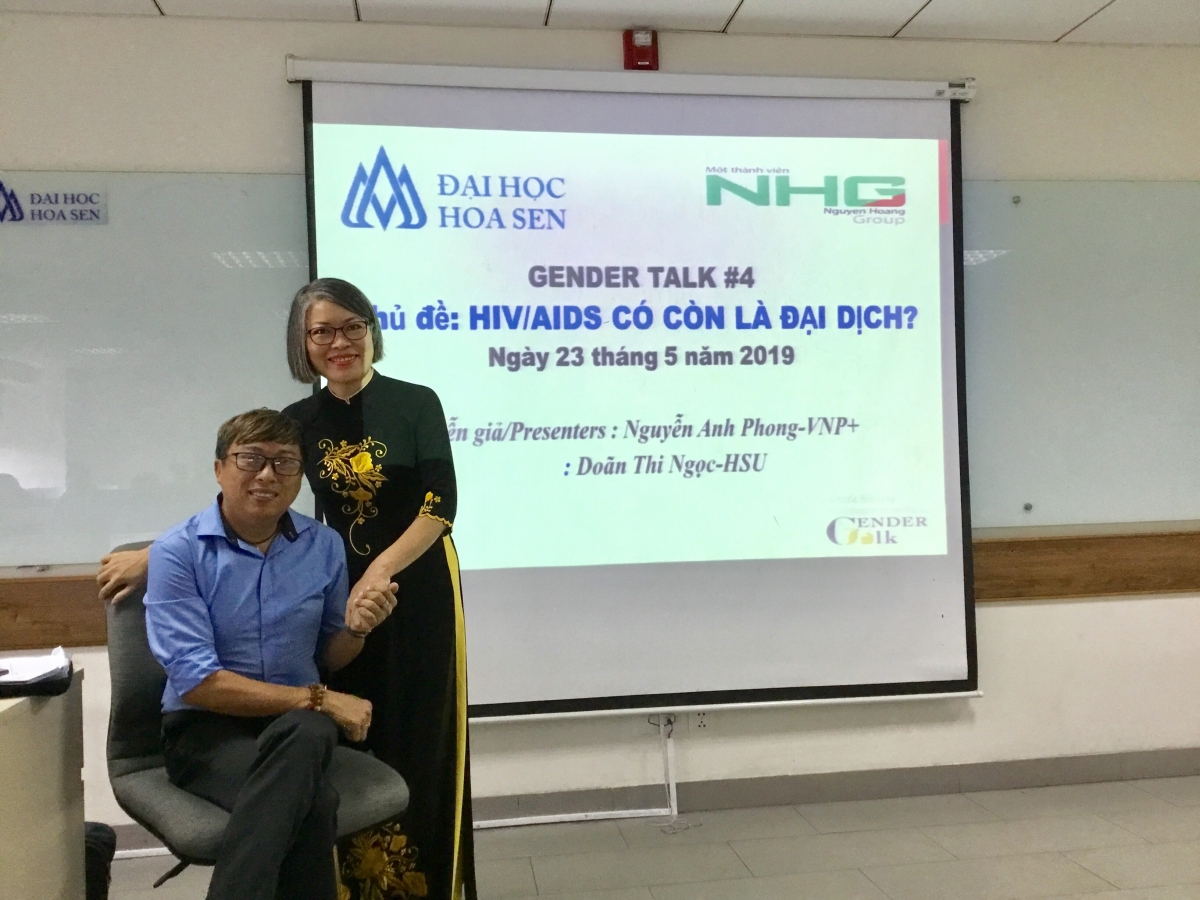
Speakers Nguyen Anh Phong and Doan Thi Ngoc
On the topic “Many aspects of Gender Equality, speaker Doan Thi Ngoc emphasized some perspectives on gender equality, the concept of gender equality and gender justice, some achievements and challenges of gender equality, and aspects or three approaches to gender equality in practice. First, the speaker introduced a fairly common concept about gender equality for the audience to share: “Vietnam has gender equality, why do you keep demanding gender equality, keep rising to demand women’s rights?” What does that mean?” Do you agree or disagree with this concept? Some audience members agreed, some both agreed and disagreed, and many students disagreed with their thoughts and shared real-life examples to prove their arguments.
Next, Ms. Doan Thi Ngoc emphasized some perspectives on gender equality, including:
- The view of gender equality is not to push men down and not lift women, or vice versa;
- The view that GMOs do not teach men to be like women and vice versa, but GMO teaches each individual to be themselves, treat everyone equally and fairly, exercise human rights, be responsible, and have dignity;
- The GMO perspective is that NOT everything is 50/50;
- The view of gender equality is NOT to eliminate the beautiful features of both men and women, but it also does NOT assume that some features are unique to women or men.
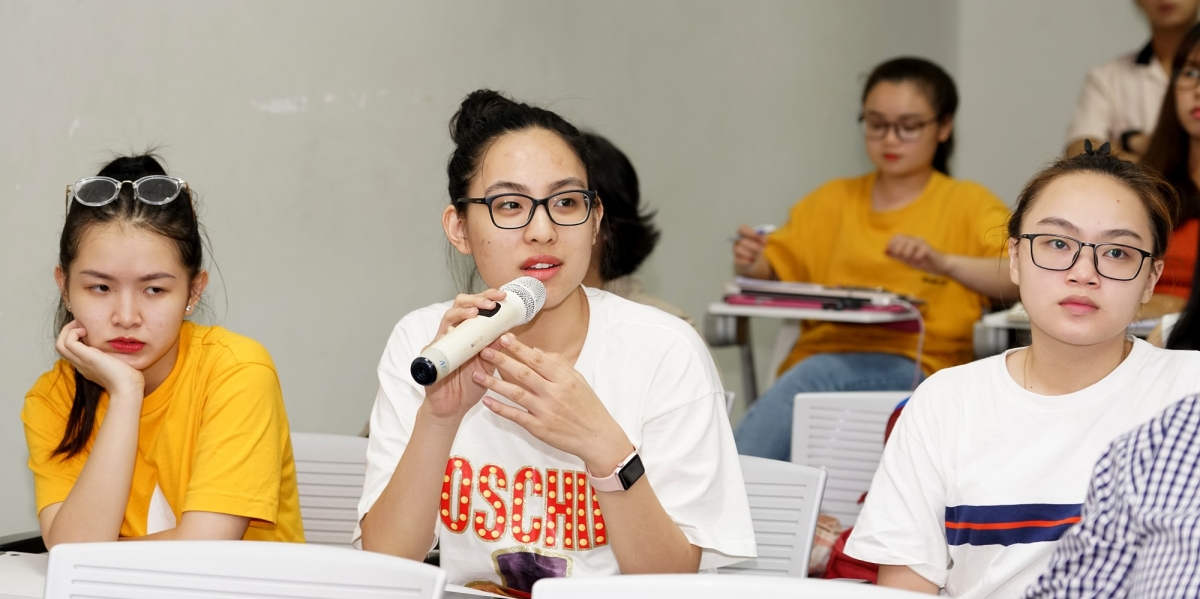
These gender equality perspectives help audiences better understand gender equality, illuminate their thinking about gender equality, and act to minimize prejudices or misunderstandings in thinking and acting on gender equality. Some people think that I sweep the floor and you wash the dishes, if you can drink then I can drink, if you carry 50 kg then I also have to carry 50 kg for gender equality. No, these are not necessarily gender equality because such behaviors and thoughts do not demonstrate gender awareness and actual gender equality.
Next, the audience is provided with the concept of gender equity. Gender equity is “the reasonable treatment of men and women based on the recognition of gender differences to ensure that men and women have equal opportunities and conditions to participate and benefit.” For example, the Labor Law stipulates that women are entitled to 30 minutes of rest per day during their menstrual period, while men are not entitled to this regulation because men do not menstruate. Lawmakers made this regulation because they relied on biological differences between women and men.
Regarding the concept of gender equality, gender equality is the fact that men and women have equal positions and roles, and are given conditions and opportunities to develop their abilities for the development of the family, community, and people. equally enjoy the fruits of that development” (Law on Gender Equality, 2006, Clause 3, Article 5). That means when talking about gender equality, we ask the question: Are the roles, positions, responsibilities, and rights of men and women in the family, in the organization, and society equal?
It is not completely equal. For example, in patriarchal families, people often give priority to sending boys to school because they believe that boys are the breadwinners, boys are better than girls, and boys are more proactive, proactive, and decisive than their children. girls, and “invest in boys with more profit” than girls. This is a misconception and gender stereotype that is positive for men and disadvantageous for women. Another fairly common social concept is that when it comes to roles and responsibilities in housework, we often think of women or girls. If we think that housework is the job of women and girls, it is unfair and creates a stereotype for women that are only suitable for housework or some people think that now that there is gender equality, women do not need to do it. housework. Housework is important and is the job of every family member, which is gender equality. Another example of the voting rights of men and women being equal. Equality needs to be shown in a practical way that they have the right to run for election and self-nomination and the criteria for running for election and self-nomination are for everyone to be called fair and gender equal. Nowadays, the proportion of women attending university is high, but when applying for a job, women often have fewer employment opportunities than men due to gender stereotypes.
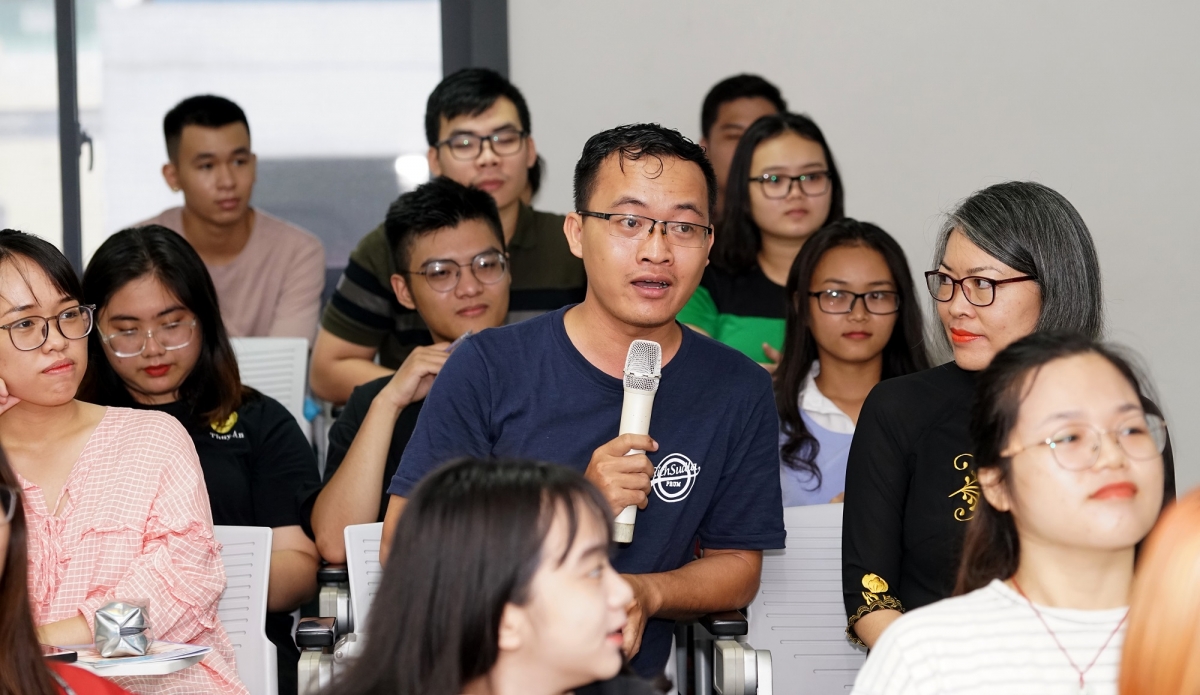
So when developing activities, programs, policies, projects, and services, it is necessary to have a gender lens and pay attention to three elements that constitute gender equality:
- Pay attention to gender differences & gender incongruities that may exist in reality.
- Pay attention to the influence of customs and practices as the root causes of discrimination.
- Policies and laws not only pay attention to general regulations but also pay special attention to regulations that demonstrate two aspects: equality and reasonable discrimination of priority factors for a specific group or group. for men or women to achieve gender equality in reality.
Regarding gender equality achievements in Vietnam, in recent years Vietnam has achieved many bright spots in gender equality. For example, according to the Ministry of Labor, War Invalids and Social Affairs (MOLISA) in 2017, Vietnam completed the legal framework and policies on gender equality, the Chairwoman of the 12th National Assembly is Ms. Nguyen Thi Kim Ngan, the ratio of women is Delegates to the 14th National Assembly are 26.8%, the proportion of women participating in the 12th Politburo is nearly 16%, the proportion of female workers is 48.3%, the proportion of women participating in business management is 48.3%. about 25%.
The challenge of gender inequality persists. Gender inequality is the deepest of all types of inequality because it exists in society and the family. Gender inequality appeared earliest in history, but it was discovered the latest. In general, in families, gender inequality is not easy to recognize or talk about because it is peaceful or obscured by emotions. Although sacrifice for the family is natural, the concept of promoting sacrifice and resignation reserved only for women for the family is an invisible barrier to the development of status and rights, the value of women. Not only that, fighting against gender inequality in the family is not easy because it is difficult to resolve by law or peace talks (Le Thi Qui, 2009; Hoang Ba Thinh, 2012).
Inequality in dual roles, also known as two jobs (domestic work and housework), often reserved for women, still exists in all social institutions. According to a survey by MOLISA and ActionAid (2016), women do housework and child care about 5-8 hours/week more than men. As we all know, time is money. 6-8 hours can create a lot of material wealth, but because they are women, they have to take on more housework responsibilities. Dual roles are one of the major obstacles to women’s choices and sustainable development. They seem to step back, giving their husbands opportunities for advancement, letting them be the breadwinner, and in some cases, they are even willing to choose small, low-paying, low-value jobs so they can have time for themselves. family. If women cannot fulfill both, they are often insecure, guilty, torn, and blame themselves.
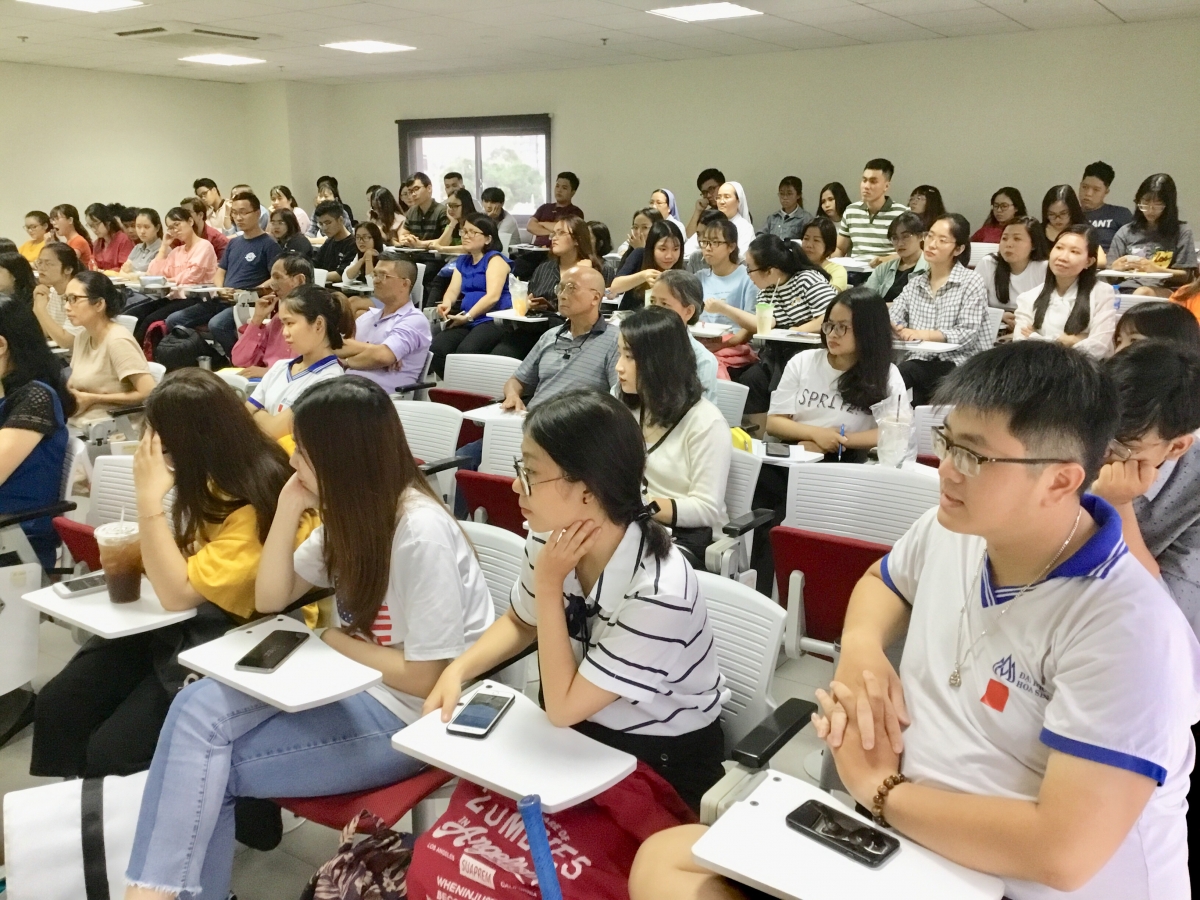
According to studies, when falling into a dual role situation, many women have only two options: 1. Reduce rest and entertainment time to take care of the family, and 2. Reduce participation in training, do not take opportunities for advancement or high growth in your career path. It is natural to sacrifice and maintain family happiness, but why only women? Gender equality is for everyone, both men and women in the family. Family is a system and for the system to be peaceful, secure, and happy, it requires the cooperation of all family members, in which the role of parents is important in maintaining family happiness. family.
In addition to the dual role, this topic also highlights wage inequality in Vietnam and around the world, retirement age inequality, gender-based violence inequality, political rights inequality, and inequality. equality in sexual harassment, inequality in child sexual abuse, and loopholes in the law that leave criminals at large, such as the case of a woman being sexually assaulted in the elevator but was only fined 200,000 VND or the case of a girl being sexually assaulted in an elevator in District 4 was also handled slowly and some points made public opinion unconvincing.
The final point of this topic refers to three approaches to gender equality in practice, including formal gender equality, protective gender equality, and substantive gender equality. In the world, no country has achieved substantive gender equality because of the barriers presented above. Many people do not properly understand these three approaches. For example, if a person says that Vietnam already has gender equality, it falls into formal equality. Because this individual does not clearly understand substantive gender equality. Gender equality essentially requires understanding the true nature of Vietnam’s efforts to move towards gender equality and recognizing its achievements as well as recognizing the fact that women are still in a more disadvantaged position due to discrimination. conduct in the past and present. Gender equality actually does not mean that women and men must be the same, but that the similarities and differences between women and men must be recognized and evaluated equally. Gender equality essentially means that men and women do not suffer from gender-based violence, do not feel unsafe in public or secluded places, men and women have the right to do what they like, the right to work in society, and the right to dream. desire, the right to express oneself without restriction, the right to self-determination and control over one’s body and matters related to oneself, without these decisions affecting or causing harm or violating the safety of the individual. others. Gender equality essentially means not only equality in the law but also equality in reality.
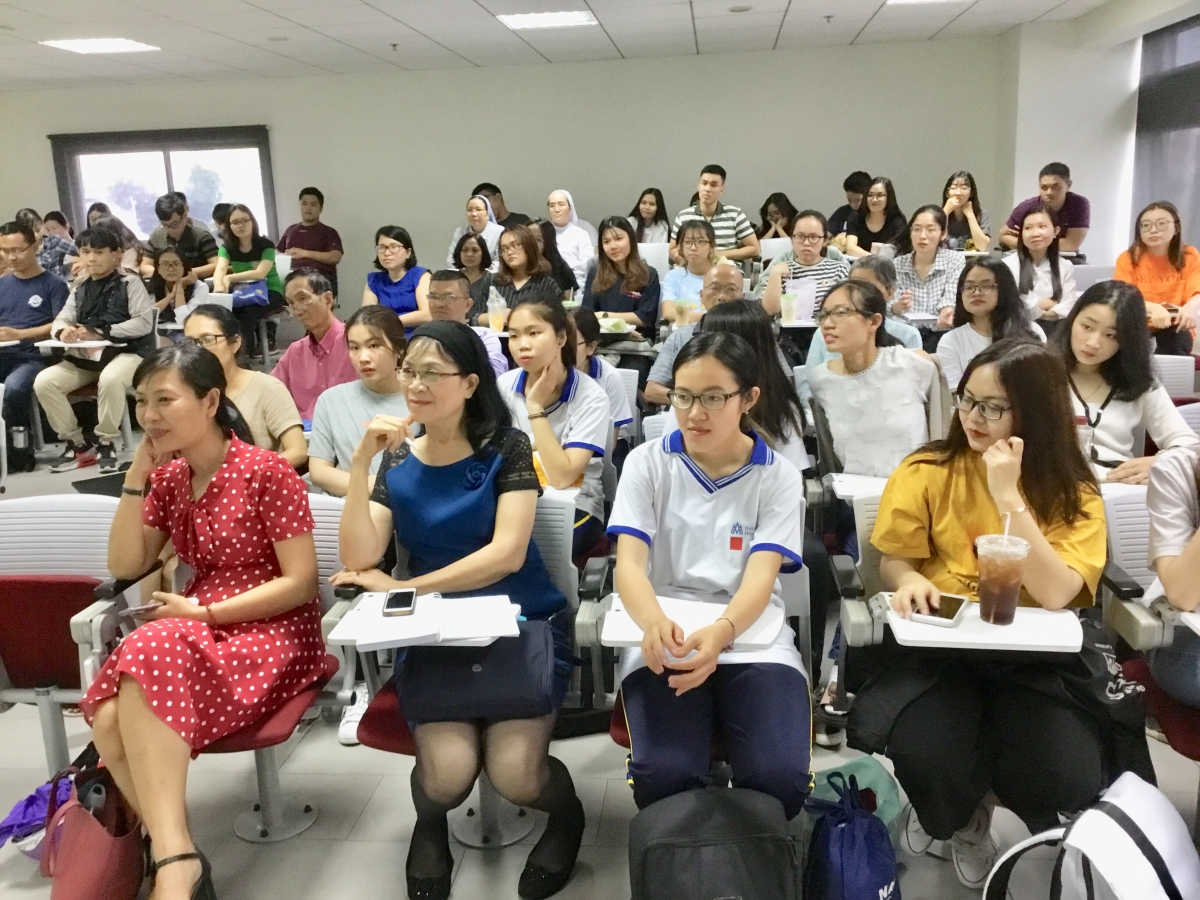
Moving on to the second topic, HIV/AIDs & Sexual Safety. This topic focuses on discussing the data of people infected with HIV, sexual rights, some ways to have safe sex, how to transmit and not transmit HIV/AIDs, how to prevent it, and when we detect an infected person, what to do.
Regarding the data of people infected with HIV, speaker Nguyen Anh Phong said that according to WHO, HIV/AIDS still has no cure is a major public health problem, and has claimed the lives of about 35 million people. people globally. In 2017, about 36.9 million people were living
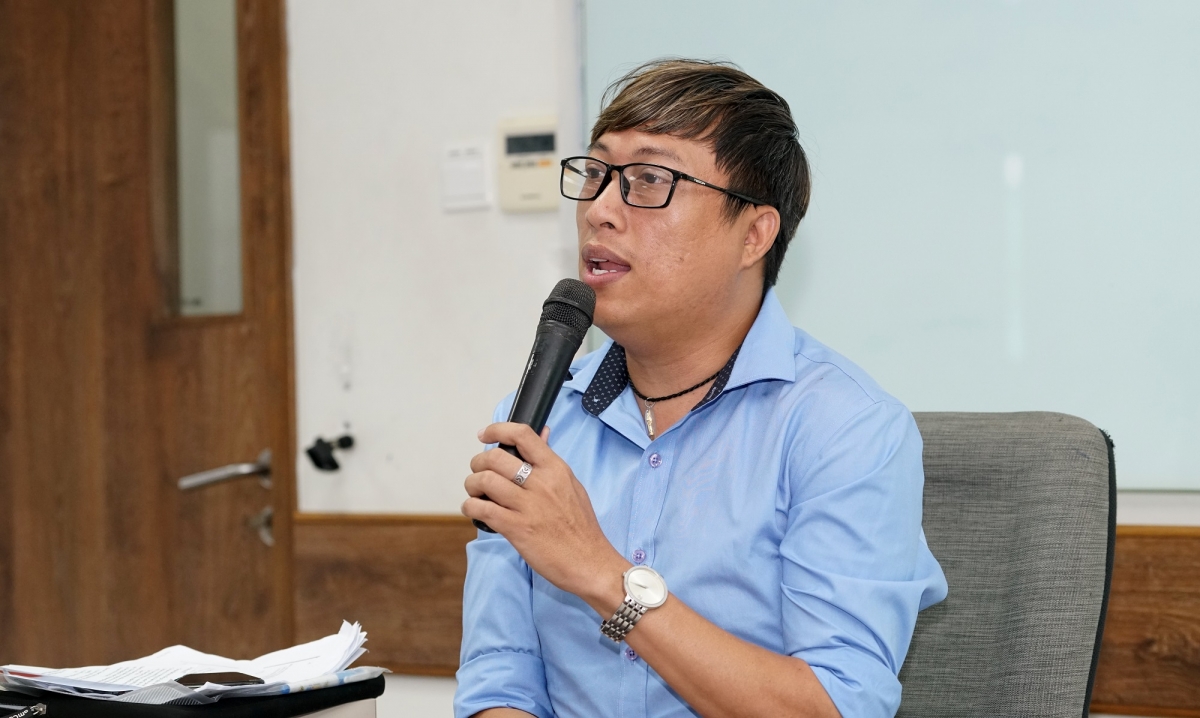
Regarding sexual rights, this is a sensitive topic because when people talk about HIV infection, they often think of sex. Sexual rights are human rights. There is nothing bad about having sex, but unsafe sex will leave many consequences, especially current and future life disturbances for that individual and the community. Therefore, understanding 10 Sexual rights to make appropriate choices is essential and it is never too late. The 10 sexual rights include: achieving the highest standards of sexual health; seeking, receiving, and exchanging information about sex education; sex education; respecting the integrity of the body; mate selection; the sexual relationship is consensual; deciding whether to have sex or not; consensual marriage; decide whether and when to have children. Sexual rights need to be considered whether they are consistent with law and morality.
Regarding sexual safety, speaker Anh Phong said that there are three ways of transmitting HIV/AIDS including: From mother to child, unsafe sex, and sharing needles or micro-injuries. The speaker said that if everyone understood the ways to prevent HIV/AIDS transmission, we would not have a discriminatory attitude and avoid people infected with HIV/AIDS. When we talk, hug, kiss, bathe in the same swimming pool, shake hands, eat together, get bitten by mosquitoes, or cough and sneeze, we will not transmit HIV/AIDS.
So to avoid the risk of HIV/AIDs infection, prevention is more important than prevention, such as knowing how to use condoms, and being faithful one-on-one with your partner; Do not let your partner’s blood, semen, or vaginal fluid enter your body. Have basic knowledge to prevent disease for yourself and your partner; Use separate items that may be contaminated with blood (toothbrush, razor, etc.); Sterilize reusable tools properly.
At the end of topic one, speaker Nguyen Anh Phong also asked students: How do you know if someone is infected with HIV/AIDs? According to the speaker, it is very difficult for us to know who is infected with HIV/AIDs if we only look from the outside. The only way is to test. When we know someone is infected with HIV/AIDS, we should comfort them, not panic, not chase them away, not discriminate, but calmly support them and immediately contact Health Centers and Heat Hospitals. Zone or My Home Clinic. Address: 152 Ba Dinh, Ward 10, District 8, Ho Chi Minh City. Hotline: 18000019.

FEELINGS OF HSU STUDENTS & GENDER TALK AUDIENCE #4
Thai Ho Thien Thanh from Luong Van Can Fund shared her thoughts about Gender Talk #4 as follows: “Once again, thank you Ms. Ngoc and Mr. Nguyen Anh Phong for your valuable sharing in the Gender Talk program.” #4 was held on the afternoon of May 23. Gender talk has become a truly open sharing-discussion space and I look forward to attending every month. I even feel sorry for skipping the program held in April 2019 due to my working schedule.”
Pham Ngoc Anh Hong shared her feelings: “Coming to the Gender talk on the afternoon of May 23 was a wonderful experience because the speakers: Mr. Nguyen Thanh Phong and Ms. Doan Thi Ngoc created a lot of personal motivation.” I am working in sociology. Besides, I look forward to many opportunities to come to Gender Talk to learn more experiences from many teachers and experts in the industry.
Nguyen Thuy Trang – A student of Hoa Sen University shared her feelings about having learned knowledge about HIV/AIDS such as: “The number of people infected with HIV is mainly in the age group of 16-29, it accounts for 62% of the total number of people infected with HIV.” 100% of people infected with HIV, young people 16-24 are at high risk. HIV has a higher chance of penetrating young people. When listening to Mr. Phong’s presentation, I feel that everyone should stand from afar and look at the lives of people living with HIV. Surely each of us can somewhat understand the hardships, difficulties, etc. they are facing. Yet many people seem to alienate, spurn, discriminate, isolate… and gradually push them out of life’s orbit, callously and unintentionally extinguishing the last remaining fire that glimmers in their hearts. They believe in life – That is human love. So why can’t we open our hearts and give them the most genuine feelings? Who knows, those seemingly small things will become priceless gifts for them to help them stand up and move on. The message that Mr. Phong wants to share with those unfortunate enough to be infected with HIV is that: we need to clearly understand the disease HIV/AIDS so that we can understand its harmful effects and know how to prevent and push away the “monster”. ” that out of the human world. Let’s not divide the world into “us and them”.
Le Thi Thien Huong shared: “Gender Talk’s topic is very good and I like participating in sessions like this. But time doesn’t allow, so I’m very sad. However, if there are any questions or topics related to human rights, I will participate to answer or comment on this issue.”
Nguyen Thuan Anh – A psychology student – at Hoa Sen University shared: “I attended Gender Talks #2 and 3. This is a very practical and useful academic activity for a student like me. Here I can update new knowledge and trends about gender, gender equality, and many other aspects. Changing awareness will change actions, changing actions will change life. I hope this activity is held more often. Speaker Nguyen Anh Phong is also the person I have been waiting for because of his knowledge and speaking style.
Nguyen Ngoc Phuong Quynh – a Business Administration major, at Hoa Sen University, shared, “Gender talk #4 recently, I found it very useful because it helped me understand clearly and how to properly prevent and be safe when having sex. This is very useful for young people today when they do not understand or are indifferent about condoms. Gender Talk #4 also helps me understand HIV, risky behaviors, and how to reduce the community’s anxiety and fear toward people with HIV because this is one of the causes of discrimination against people with HIV.
Nguyen Thi Cam Tien – A student of Hoa Sen University shared, “I am a student still in school, equipped with a lot of knowledge and ways to prevent this disease, but I am still very confused about its infection. It wasn’t until I attended the Gender talk on the topic of the HIV epidemic, presented by Mr. Phong, that I better understood what “Safe Sex” is and that for people with HIV, need to avoid it away from them. Furthermore, Gender talk helps me have a more correct view of things through the lens of gender. And more importantly, what do women need to do to prevent the transmission of this disease from their husbands?
Duong Nhat Quang – A student of Hoa Sen University shared his feelings, “Gender Talk #4 on May 23, 2019, mentioned the disease HIV/AIDS and reminded us that we should carry out our responsibilities, which is important. safe sex. Although I had previously researched safe sex on my own, the Gender Talk session added some new knowledge to me, as well as letting everyone know that there is nothing wrong with sex, only unsafe sex is wrong. Issues of inequality are also raised because gender equality is not only a basic human right but a necessary foundation for a peaceful, prosperous world. prosperous and sustainable. As currently reported, in 18 countries, husbands can legally prevent their wives from working; In 39 countries, daughters and sons do not have equal inheritance rights; and 49 countries lack laws protecting women from domestic violence (United Nations: Gender equality and women’s empowerment,” 2019). When men and women in similar occupations work, women earn the equivalent of $0.98 for every dollar earned by men. In other words, a woman doing the same job, with the same qualifications as a man, is paid two percent less. (“Gender Pay Gap Ratios, Stats, and Infographics 2019 | PayScale,” ). Most notably in Vietnam, women in Vietnam have an average annual income of 3 million VND lower than men, equivalent to a month’s income. This gap did not change between 2011 and 2014, and the income gap persists even though the education gap has narrowed.
Finally, there were about 20 responses from the registration link recording their comments about Gender Talk as follows: Gender Talk is a very practical, useful, interesting, knowledge-expanding academic activity on gender equality. for students. Gender Talk also shares stories that have never been heard and come to Gender Talk to learn from everyone. Gender Talk includes both academic knowledge and real-life stories. Some viewers told me to attend to listen and verify whether it was good and true to the “rumors” or not. I hope Gender Talk will be held on Saturday or Sunday so it doesn’t clash with the school schedule.
Author: Doan Thi Ngoc – Faculty of Social Sciences, Hoa Sen University





